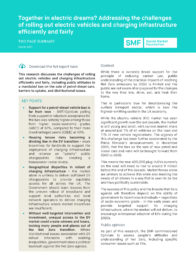Decarbonising the surface transport sector is one of the most significant aspects of achieving the UK’s legal commitment to reach Net Zero emissions by 2050. This report addresses the challenges of rolling out electric vehicles and charging infrastructure efficiently and fairly for all.
Key points
The policy agenda for electric vehicles is unlikely to be successful without sufficient and fair access to charging across socio-economic groups, geography and housing tenure.
- Support for a petrol-diesel vehicle ban is far from won, particularly amongst those from lower socio-economic grades – SMF/Opinium polling finds support or reluctant acceptance for the ban was notably higher among those from higher socio-economic grades (ABC1) at 57%, compared to their more disadvantaged peers (C2DE) at 43%.
- Housing tenure risks becoming a dividing line in the EV transition – over a third of renters (35%) reported it was not possible to install a chargepoint near their home, compared to half as many (17%) homeowners. Weak incentives for landlords to support the deployment of charging infrastructure and reliance on “patchy” public charging infrastructure risks creating a homeowner-renter divide.
- Geographical disparities in rollout of charging infrastructure – the market alone is unlikely to deliver sufficient charging infrastructure to provide equitable access for all across the UK. The Government should learn lessons from the unequal rollout of broadband and support local authorities and local network operators to deliver charging infrastructure where market incentives are insufficient.
- Without well-targeted government intervention and investment, unequal access to the EV market could create winners and losers, locking many people and places out of the Net Zero transition. Where unequal access intersects with existing inequalities, the Government risks a political backlash against its plans to decarbonise private transport, and the Net Zero agenda more broadly.



